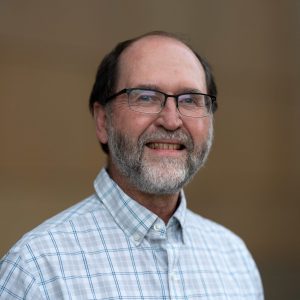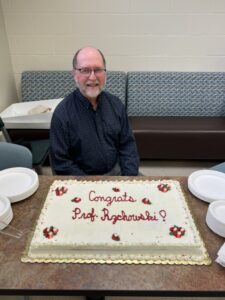
Congrats to Prof. Mark Rzchowski who has announced his retirement, effective January 17! Rzchowski is a condensed matter experimentalist who joined the department as an assistant professor in 1992 and has been a full professor since 2004. He served as Associate Chair for Undergraduate Program and Academic Affairs from 2008-10 and again from 2011-24.
When Rzchowski arrived to UW–Madison, high-temperature superconductivity had recently been discovered, and his early research largely centered on that topic, focusing on novel measurements of their fundamental physical properties.
“But I soon moved in different directions, collaborating with Chang-Beom Eom, a new faculty member in materials science and engineering expert in thin film growth,” Rzchowski recalls. “He had been working in superconductivity but had been branching out into some new systems, and we moved together in those directions.”
Rzchowski and Eom have collaborated for over two decades now, pairing forefront growth and manipulation of crystalline thin films with state-of-the art measurement approaches. Their collaboration has resulted in over 70 co-authored papers largely focused on quantum correlations and topologies in complex oxide thin-film materials. In spintronics, a technology that takes advantage of the intrinsic quantum spin state of an electron to substitute spin currents for the charge currents in “elec”tronics, they developed an all-thin-film membrane-based system that demonstrated an intrinsic coupling between voltage and spin. This helped to address a persistent problem in spintronics, namely better controlling magnetism at the nanoscale: the extreme thinness of the material allows low operating voltages to control the spin properties.
In another spintronics study in 2023, Rzchowski and Eom demonstrated uniquely oriented thin films of oxide crystals that controls the natural symmetry of the crystals, allowing them to produce vastly more useful spin currents — a critical step forward in advancing next-gen computer memory devices.
“I am so lucky to have known Mark — as a collaborator, colleague, and friend,” Eom says. “His brilliance as a scientist and kindness as a person will stay with me. I wish him happiness and fulfillment in the years ahead and I hope to continue sharing the joys of life for many years.”

In 2022, Rzchowski was elected a Fellow of the American Physical Society for “pioneering discoveries and understanding of physical principles governing correlated complex materials and interfaces, including superconductors, correlated oxide systems multiferroic systems, and spin currents in noncollinear antiferromagnets.” He was nominated by the Division of Materials Physics.
Rzchowski has provided decades of service to the department, some of this time as associate chair. In this role, he led the redevelopment of several of the large courses, for example hiring course coordinators to provide consistency. He also was largely involved in the overhaul of algebra-based Physics 103 and 104, supported by the provost’s REACH initiative. REACH is designed to give students as many chances as possible to actively engage with physics principles and ideas, and to collaborate in group settings. An assessment of the program’s implementation showed a significant increase in concept mastery in these . He has represented the department at conferences presenting the REACH implementation and analysis of learning outcomes.
In March 2020, Rzchowski successfully led the transition of every course to all-online instruction when the Covid-19 pandemic abruptly sent everyone off campus, then to hybrid online/in-person instruction as students slowly returned. More recently, he helped leverage what was learned from those semesters into offering the summer session of Physics 103, and, now this year, Physics 104, as fully online courses. These online offerings have more than tripled summer enrollments — both UW–Madison students as well as visiting students.

Rzchowski was also chair of the department’s space committee in the early 2000s and oversaw the design of new laboratory and office space in Chamberlin Hall, and the transition from Sterling Hall to Chamberlin .
Prof. Emerit Bob Joynt, who overlapped with Rzchowski as associate chair when Joynt served as department chair from 2011-2014, says: “I worked closely with Mark Rzchowski for over 30 years. Of all my colleagues, he was the one whose advice I valued most, and the one who could most be trusted to follow through on everything he ever promised (which was a lot). He was not only a talented researcher, but he also was very generous with his time for the department, particularly the teaching program. He always did the jobs that were the most needed, usually those that were also the most thankless. So now, one last time, thank you Mark!”
Prof. Mark Eriksson, who served as department chair from 2021-2024, also overlapping with Rzchowski’s tenure as associate chair, says: “Mark Rzchowski made many contributions during his career in teaching research and service. In this last category for many years Mark served in the essential role of Associate Chair for Academic Affairs in which he solved — semester after semester — the complex riddle of matching instructors to courses in an optimal way.
— By Sarah Perdue, department of physics. Adam Malecek and Jason Daley of the College of Engineering contributed to this story